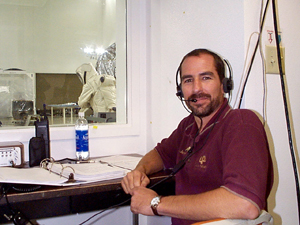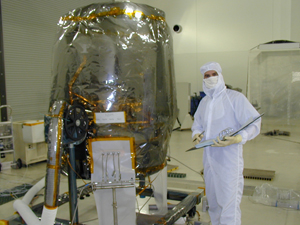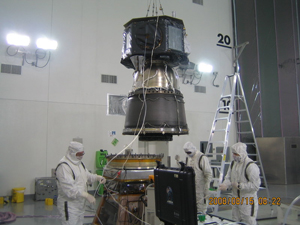Meet the IBEX Team: Jeff Ehrsam

When Jeff Ehrsam was a kid, he wanted to grow up to be an astronaut, a test pilot, or a "rocket scientist." "In high school I figured out that my eyes were not good enough to qualify for fighter pilot or test pilot careers, so my lesser career interests became split between commercial flying and aero engineering," Jeff said. "I started flying at age 15, and later on, at the minimum allowed age, I used my commercial and instructor ratings to help pay for college at Cal Poly San Luis Obispo. After three years of aero engineering school, I had to choose between flying for the airlines and aero engineering. I chose rockets."
Jeff grew up near, and is now employed at, Vandenberg Air Force Base in central California. His father, who grew up in a farming community in Kansas and went to school in a one–room schoolhouse, also spent his engineering career at Vandenberg. Jeff works for the NASA Launch Services Program (LSP). The LSP provides launch vehicles as a support service to space vehicle programs such as IBEX. Jeff and the LSP team not only provide the vehicles for launches but also assist their customers with integrating their spacecraft to the launch vehicles. LSP also provides spacecraft processing support at the launch site.
Jeff has more than twenty years of experience processing solid rocket motors, fueling hydrazine propulsion systems, and providing support services to missions on Vandenberg AFB. IBEX is a somewhat unique mission in that it utilizes both solid and liquid–fueled propulsion systems. Jeff made a special request to work on the IBEX mission because the propulsion requirements for IBEX were a good fit for his years of experience working on such systems and because he likes the physics involved in the mission. "I see physics as the foundation to engineering advancement, human progress, and truth about the world around us."

Image Credit: Vandenberg Air Force Base, IBEX Team
When asked to describe a typical day in the LSP, Jeff finds that to be a difficult request. His job can vary widely, from assisting IBEX with a fueling contract to hosting a meeting at the payload processing facility, from standing inside a transport vehicle looking at the design of vehicle modifications required to transport IBEX to practicing with his team to hone their procedures to combat a toxic hydrazine fuel leak. His job also involves travel, especially to Kwajalein Island, the launch location of IBEX. "This is a jack–of–all–trades job," Jeff exclaims.
Jeff‘s interests span far beyond rockets and spacecraft, however. When he was younger, he began racing motorcycles — dirt bikes — in the desert. When he outgrew that hobby, he and his friends started driving off–road cars in California, and he now races in the world–famous Baja 1000 Off–Road Race along the entire peninsula of Baja, Mexico. The grueling contest involves one thousand miles and twenty–two hours of non–stop driving through remote deserts and mountains — and very few rules. Jeff also likes to fly light aircraft and travel.
Jeff has valuable advice for anyone who may be thinking of a career in engineering: "Good grades and a technical degree are obvious. The most widespread downfall I see in engineers is hands–on capability. For example, if you want to be a mechanical engineer, then take automotive courses so you know how to bleed a hydraulic system. Do some welding. If you want to be an electrical engineer, then build something and test it with your own hands. Too many engineers struggle in the real world because they lack a balance between the theoretical and the physical."
His words of wisdom continue: "Prepare for the business end of engineering. Learn about contracts, proposals, and statements of work. Your work will be bounded by financial and contractual considerations. When I started my first job I was idealistic about the purity of engineering and I adjusted slowly to the reality of the business end. Balancing the two will help you to advance in this field."
What is in store for Jeff‘s future? He is looking forward to the successful launch of IBEX, and while he would wish that rocket propulsion would quickly advance to the use of the dilithium crystals that powered Star Trek‘s starship Enterprise, a more realistic goal of his is to be involved in more physics–related missions similar to IBEX and Gravity Probe B. "I am proud to be part of the IBEX team and I can‘t wait to see what IBEX detects and discovers. I think missions like IBEX, Gravity Probe, and others will combine to create a better understanding of reality and perhaps provide major breakthroughs in technology."
